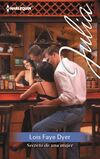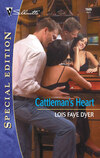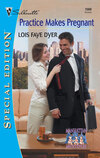Kitabı oku: «A Coulter's Christmas Proposal», sayfa 3
The room was quiet, homey with the soft glow of lamplight over the deep-cushioned leather sofa and chairs, the polished wooden floors and the fireplace with its heavy oak mantel.
The last time he’d seen the room had been the morning he’d driven away from the Triple C. Joseph Coulter had stood in the center, fury on his face, and told his four sons that if they left, they couldn’t come back until they knew he was dead.
Eli couldn’t help but wonder if his father had known he was predicting their future.
And he couldn’t help but wonder what the hell had made the old man leave everything he owned to the sons he’d spent years hating.
It was a question with no answer.
Eli hit the switch, shrouding the big room in darkness once again, and climbed the stairs, memory making him sure-footed as he moved down the upstairs hallway to a room near the end.
When he flicked on the light here, he felt as if he’d stepped back in time. Nothing about his old room had changed. A poster of Van Gogh’s Starry Night was tacked on the wall above the desk. Next to it was a poster from the Daniels County Fair, listing Brodie as a rodeo competitor.
He dropped his bag on the heavy nineteenth-century oak chair next to the bed. Unbuttoning his shirt, he shrugged out of it, hung it over the back of the chair and sat on the edge of the bed to pull off his boots and socks. Standing once again, he unsnapped his jeans and shoved them down his legs and off before laying them over the chair seat.
The scent of clean sheets and fabric softener reached him as he pulled back the sheets. He suspected either Mariah or Cynthia had put fresh sheets on his bed and he made a mental note to thank them tomorrow. Then he snapped off the light, slid between the sheets and closed his eyes.
The Technicolor image of thick-lashed hazel eyes, dark hair and smooth skin instantly flooded him. He wondered hazily if Amanda Blake’s soft eyes and lush mouth were going to haunt him from now on, but then sleep caught him, pulling him down into soft, welcome blackness.
Chapter Three
Despite the weariness that had sucked him into sleep the night before, Eli woke just after eight o’clock the following morning. He’d forgotten to close the blinds and he squinted against the bright sunlight that poured through the windows before tossing the bedcovers back and rising.
He showered and shaved, then headed downstairs to make coffee in the quiet kitchen. The refrigerator yielded a plastic container of fried chicken and he ate three pieces while standing at the sink, staring out the window. From his vantage point, he could see the backyard, with the tall old maple tree in the far corner, the fence that marked the house area’s boundaries, and the pasture that stretched toward the buttes rising not far away.
Once again, he felt the tug of familiarity and a sense of homecoming.
Maybe what he’d felt last night hadn’t been only the result of a lack of sleep and the late hour, he thought.
The coffeemaker beeped, and he washed his hands, returned the chicken container to the fridge, then opened the cabinet over the coffeemaker. As he’d hoped, the cupboard held a variety of cups and mugs. He filled a thermal mug with strong black coffee and left the house.
It was just after 9:30 a.m. when he reached Indian Springs, and his meeting with the attorney lasted less than an hour. He left Ned Anderson’s office with an envelope filled with copies of legal documents and paused on the sidewalk outside.
He glanced at his watch and realized that it was too early for lunch, but despite the chicken he’d eaten earlier, his stomach felt empty. He was considering crossing the street to the Indian Springs Café when a small car pulled into an empty parking slot just in front of the eatery. Amanda Blake stepped out, a file tucked under her arm and a purse slung over her shoulder. She disappeared inside the café.
I wonder where she’s been and who she interrogated this morning.
With sudden decisiveness, he crossed the street and pulled open the door to the café.
The bells hanging on the inside of the glass panel chimed as the door swung closed behind him. He paused, scanning the room with its center tables ringed by booths lining the outer walls. Amanda was seated in a booth toward the back, her head bent as she studied the menu.
He wound his way around the tables and slid onto the seat opposite her.
Amanda looked up from the menu when someone sat down across from her, the list of pies immediately forgotten as she realized the man was Eli Coulter. “Good morning, Eli.” She hesitated only a second before continuing. “I’m surprised to see you here.”
His eyes crinkled at the corners as he smiled, clearly amused. “Here in Indian Springs—or here in your booth?”
“Both, actually.” Her fingers curled tighter on the edges of the vinyl-covered menu, reacting to his charm.
“I had to check in with the estate attorney this morning. His office is just across the street and when I left there, I saw you park and come in here.” He glanced around the half-full café, then back at her. “Since I was hungry, I thought I’d come over and join you.”
“You did?” Her voice rose in disbelief. She stared at him but his expression was innocently friendly. “Why would you …” She paused as the waitress arrived. Amanda placed her order for rhubarb-strawberry pie and coffee, waiting impatiently while Eli did the same and the woman left before she continued. “I had the distinct impression last night that you didn’t want to talk to me again. In fact, I assumed after our conversation that you’d be avoiding me like the plague. So why are you sitting at my booth?”
“Maybe I realized this morning that I might have been a little cranky last night and might need to apologize for being rude.”
An apology was the last thing she’d expected. She studied his face before slowly shaking her head. “While it’s nice to hear, I don’t believe for a minute that you didn’t mean what you said. Because your brothers clearly don’t want me writing about your mother either. Only they were a little more polite when they refused to help me,” she added. “So tell me the real reason you’re here.”
Amanda thought she saw surprise and brief admiration flash across his features before he answered.
“It’s not my practice to be rude to guests in my family’s company, and the apology for that is sincere. But that’s not what brought me in here. I saw you across the street and wondered who you’d been interrogating this morning.” He shrugged. “Chalk it up to curiosity.”
She rolled her eyes, annoyed with his reasons but pleased he’d been honest.
“I wasn’t interviewing anyone—I was at the library reading newspaper archives. Why do you and your brothers dislike reporters so much?” she asked bluntly.
“Because our experience with them hasn’t been good,” he told her.
She tilted her head, clearly puzzled, but didn’t demand he elaborate. Because she didn’t push, he decided to tell her.
“We were kids when Mom died, but for several weeks, reporters swarmed us every time we went into town. Dad made a rule that we had to stay together but it was hard to do. Eventually, each of us was confronted—none of us were safe. Three reporters for a celebrity gossip magazine caught me alone outside the drugstore and grilled me about the details of Mom’s death. By the time they were done, I was so confused that I had no idea what I’d told them.” Eli heard Amanda’s gasp of outrage but continued. “I was nine years old. What did I know about fielding reporters’ questions?” He shrugged. “They concocted a bunch of lies, wrote the story as if it were truth, and gossip columns in the arts sections of city newspapers picked up the story and spread it everywhere. Dad grounded me for the entire summer.”
“But that wasn’t fair,” Amanda exclaimed. “You were just a child.”
“He’d told us never to get separated when we were in town. I broke a rule.”
She frowned at him and opened her mouth to speak but he continued before she could argue further.
“The fallout from that story never really went away. When I followed my mother into the same field, her art and life inevitably came up. And just as inevitably, I kept being asked questions about that same damned story.” His smile was cynical. “Reporters’ articles never go away. They live forever on the internet. And that,” he told her with conviction, “is why I don’t trust reporters.” Or just about anyone else who seems interested in Mom’s life, he thought grimly.
Amanda was appalled. She could only imagine how being hounded while grieving his mother’s death had scarred the little boy Eli had been.
“No wonder you have a negative view of reporters,” she said. “I doubt it will change your mind but for the record, I’ve never pursued children to get a story. Nor would I,” she added firmly. “It’s unethical—not to mention immoral.”
A faint smile lit his eyes. “I’m glad to hear you say that. It’s good to know someone in the press has ethics.”
“I looked you up on the internet last night,” she told him. “I found a brief bio on your agent’s website, but beyond that, there wasn’t a lot of information.”
He nodded just as their waitress returned with their drinks and pie. He waited until she’d left before continuing. “I’m happy to let my agent field any requests for publicity. I gave a few interviews in the beginning but after being misquoted more than once, I avoid talking to the press.” He picked up his fork, pointing it at her. “For the record, this is not going to show up in your book, right?”
Amanda laughed. “You look so ferocious, threatening me with your fork.”
He glanced at the fork, then back at her, and shrugged. His green eyes lit with warmth and self-deprecation. “Not a very effective weapon, is it?”
“No, I’m afraid not.”
And with that, the last of the wary animosity between them seemed to evaporate. In tacit acceptance of the truce between them, they chatted for the next hour over coffee, although each carefully kept their comments general.
Nonetheless, when they left the restaurant, Amanda found herself wishing he was an ordinary guy and not part of her research. She liked him, she thought as she slid into her car and watched him jog across the street to climb into a pickup truck. She had no illusions that their sharing a booth and chatting had permanently changed his view of her. It felt more as if he’d called a temporary truce, and she suspected that the next time they met, he would likely still be suspicious of her motives.
She’d never expected to meet someone like him on this trip and her attraction to him complicated matters. With a sigh, she started her car and backed out of the parking space.
Regardless of how much she was drawn to Eli Coulter, she still had work to do, she told herself firmly.
Despite her best efforts to concentrate solely on her research, however, thoughts of Eli smiling as he sprawled opposite her in the café booth kept intruding.
Eli spent the half-hour drive back to the ranch trying to figure out what it was about Amanda that made him tell her things he usually kept to himself.
Was it the warm interest in her hazel eyes that lured him into opening up and confiding in her?
He reached the ranch house, no closer to understanding the effect she had on him. He went inside and when he found the house empty, tossed the packet of legal documents on the table and left again to search for his brothers.
Just as he stepped off the porch, Cade rounded the corner of the barn and walked toward him.
“Hey,” Eli called as his brother neared. “Did you bring the keys?”
“Yeah.” Cade lifted his hand, a set of metal keys on a round metal ring dangling from his fingers. “Are you ready to do this?”
“As ready as I’ll ever be,” Eli told him, accepting the key ring and shoving it in his jeans pocket. “Where’s Zach?”
“He’s meeting us at the studio.”
The two men climbed into Eli’s truck and left the ranch yard, following the gravel road for a quarter mile before turning into a dirt drive that led off the road and beneath the thick green leaves of towering maple trees. Zach was already there, leaning against the front bumper of his pickup, arms crossed. He straightened as Eli parked next to him, joining Cade to follow Eli up the short walk to the single-story studio’s front door.
“I pulled the plywood off the doors and windows.” Zach pointed to a stack of wood on one side of the walk. “The Lodge had all the windows covered when we went in and we couldn’t see a damned thing. I figured ripping the wood off would save some time.”
“Thanks.” Eli fitted one of the keys into the lock. Stiff from years of being unused, metal grated against metal before the lock mechanism turned and slid free. Eli pocketed the keys and opened the door, shoving it inward and stepping over the threshold.
He brushed his hand over the light switch beside the door frame but got no response.
“Electricity isn’t working,” he commented as he halted just inside, his gaze sweeping slowly over the interior.
Cade and Zach joined him, as silent as he as they studied the big room.
Despite being closed and shuttered for more than two decades, the area was surprisingly undamaged. Tools hung neatly on the wall above the long workbench, where welding equipment sat next to a vise that held a curved piece of blackened metal. The white-painted walls were hung with sculptures in various stages of completion, the silver and copper metal black with tarnish and draped with ghostly swathes of cobwebs. A thick layer of dust coated every surface in the long room and the silence was eerie.
“Looks better than the Lodge did when we opened it,” Zach commented.
“I don’t see water damage, so with any luck, the roof’s still sound,” Cade agreed. “And there’s no sign of the mice and raccoon problems we found at the Lodge.”
Eli pointed at the floor, where mice droppings were scattered in the dust. “Mice have been in here. Most everything in the building is wood or metal, though, so there’s probably not much they could destroy.”
The three walked farther into the room. The bungalow space was divided into a small bathroom and storage room to the left of the entry, while the remainder was one long, open room. At the far end, most of the wall was taken up by a stone fireplace, built of smooth river rocks. A small corner kitchenette held an apartment-size range, refrigerator and cupboards. The side of the building facing the lawn that sloped down to the creek had French doors.
Eli steeled himself to look at the glass-paned doors, which opened out onto a wide deck with shallow steps that led down to the lawn and the creek beyond. It was there his mother had leaned, laughing at him and his brothers as they played in the water on that fateful day. They’d teased her into joining them and she’d impulsively grabbed the rope tied to a limb on the old tree, swinging out over the water to join them. She’d hit her head on a half-submerged rock and died from the injury within days.
He yanked his thoughts away from his mother’s death and stepped farther into the room, moving to the long worktable.
Behind him, Cade and Zach walked forward as well.
“I’ve wondered if Mom left any finished pieces in here,” Zach commented. “But it doesn’t look like it.”
Eli looked over his shoulder, turning in a slow half circle to scan the room. “Lots of unfinished sculptures hanging on the walls,” he said. “But she always stored the final pieces in the vault when she was done working on them.”
“The vault?” Zach’s eyebrows rose, his eyes questioning. “She had a vault?”
“Sure. Don’t you remember?” Cade joined Eli and paused, hands on hips as he looked around the room, a faint frown on his face. “She and Dad argued about the cost but Dad finally gave in. What I don’t remember, though, is where it’s located.”
“It’s behind the fireplace.” Eli strode the length of the room, dust puffing upward from beneath his boots.
“Why don’t I know this?” Zach asked, following him.
“Mom had it put in the summer you two went with Dad to visit the McClouds in Wolf Creek. You were gone a week, and when you came back, it was already installed.”
Eli reached the fireplace, counted rocks to the left of the mantel edge, three over and four down, and pressed the heel of his hand against a smooth white stone. The stone moved inward with a groan, a grating noise loud in the room as a panel swung outward.
“Well, I’ll be damned.” Cade stared at the inky opening. “How far in does it go?”
“The anteroom is small, maybe enough space for four or five people. Plenty of room to stand while you dial in the combination for the lock.”
“Dial in the combination?” Zach peered into the darkness. “How old is this vault? Nobody uses dial locks anymore.”
“Mom wanted an old-fashioned vault with tumblers. I’m sure she had a reason but I can’t remember what it was,” Eli replied.
“She probably just wanted an old-fashioned safe,” Cade commented. “She always chose antiques, if she could get them.”
“Makes sense,” Zach agreed. “God knows, she collected a ton of other antiques.” He moved toward the door. “I’ll get the flashlight from my truck so we can go inside.”
He was back short moments later. Eli took the flashlight and switched it on, stepping through the opening. His brothers followed.
The room was bigger than Eli had remembered, with enough space for perhaps a half dozen people to stand. He swept the flashlight’s beam over the wall opposite the entry and found his memory about the vault was correct. The entire wall was a heavy black metal door with a large combination lock and solid handle just left of center. Gold paint scrolled around the edges of the huge door.
“Somebody must have salvaged this out of an old bank,” he commented, stepping closer to run his fingertips over the round combination lock that was as big as his palm.
“That would be my guess,” Cade agreed.
“The question is, how the hell do we get it open?” Zach asked. “If we can’t find the combination, we’ll have to hire a locksmith to drill out the lock.”
“Mom had a thing about letters and numbers,” Eli said slowly. “Remember the games she used to play with us?”
“She used the first letters of our names and their number in the alphabet,” Cade said, recognition dawning. “She loved those games.”
“Yeah, and if I remember right …” Eli walked out of the small hidden room and crossed to the worktable. “She hid the combination in plain sight.” He brushed off a 1920s mechanic’s vise clamped to the edge of the table, then used his thumb to rub away the dust filling the grooves of a set of numbers etched into the side. To the casual observer, the numbers looked like an identification for the vise. But they meant something else to Eli. “And here it is.” He memorized the short set of numbers and returned to the hidden room to spin the dial. The tumblers clicked audibly into place, and he lowered the handle, pulling the door open. The big door moved ponderously, the hinges protesting with squeals and creaks.
Cade handed the flashlight to Eli and gestured him forward. Eli stepped into the vault, his brothers close behind.
He whistled, a long, low exclamation of surprise.
The vault door concealed a room at least ten feet square, with concrete walls and floor. Heavy metal shelves were bolted to one wall and held a collection of silver and copper sculptures. Opposite the shelves, two strongboxes sat on the floor. Hung on the wall above them were a dozen or more medium to large sculptures of mustangs, antelope, deer, eagles and hawks.
Eli moved slowly along the wall, brushing his fingertips over the tarnished silver and copper of manes and tails until he reached the strongboxes. Bending, he slipped the latch on the first one and lifted the lid.
Stunned, he went down on his heels and stared at the interior of the box. Stacked neatly inside were wrapped bars of silver. He leaned over and slipped the latch of the second strongbox, lifting the lid to reveal the gleam of copper.
“Damn.” Cade’s stunned voice sounded behind him. “Is that what I think it is?”
“Yeah,” Eli confirmed. “Silver and copper. Probably worth a fortune in today’s market.”
“Two million?” Zach asked hopefully.
Eli shook his head. “Unfortunately, no.”
He rose and crossed to the shelving, glutting his senses on the graceful curves and angles of his mother’s work. “She was amazing,” he muttered, once again trailing a finger over the curvature of a mustang’s copper back. “Absolutely amazing.”
“Dad couldn’t have known what was in this vault,” Cade said. “Mariah said he barely made a living those last few years.”
“Doesn’t make sense that he wouldn’t have sold some of this to keep the Triple C in better shape,” Zach put in.
Eli agreed. “Only a few of these pieces are finished, but a Melanie Coulter sculpture in today’s marketplace, even unfinished, would have given him added income over the years—probably enough to live comfortably. So why didn’t he do it?” he mused as he slowly assessed the contents of the vault.
“He didn’t sell anything,” Cade said. “It’s as if the ranch and everything on it were frozen in time when Mom died.”
“Certainly after we left,” Eli agreed. “My room even has the same posters on the wall and my old boots on the floor in the closet.” He shrugged, trying to shake off the sadness and confusion that hung like a shadow in the room. “I doubt we’ll ever know all the reasons he did what he did. All we can do is try and sort out what’s left.” He waved a hand, indicating the shelves, walls and the two strongboxes. “I need to take a thorough inventory, but off the top of my head, I’m guessing there’s a way to maximize the value of what we’ve found here.”
“Do you think selling everything will pay off the taxes?” Zach asked.
“Probably not.” Eli shook his head. “Especially not if we call a dealer and tell him we’re dropping all this on the market at once. Mom’s sculptures are valuable, but that’s partly because so few of them ever come up for sale. If we flood the market with what’s in this vault, we stand a good chance of making the value drop like a rock.”
“So we’ve got a lot of value here but we can’t sell it? What’s the answer?” Cade frowned, his gaze locked on Eli.
“I don’t know yet. Let me think about it.” Eli took a wooden box from a shelf and lifted the lid. “Look at these,” he said, his voice reverent as he stared at six intricately worked platinum rings, each set with a different gem.
“I didn’t know Mom made jewelry,” Zach said.
“She didn’t make a lot. She preferred working with bigger designs, bigger pieces, but there are a few necklaces, bracelets and rings owned by collectors.” Eli frowned, trying to remember what he’d learned about his mother’s work. He’d been too young when she died to fully understand her body of work, but as an adult, he’d made a point of studying her collections. “Any jewelry by her is so rare that I think they must have been custom pieces, made for special clients. I didn’t know there were any here, uncirculated. The rings are all versions of the same design, almost as if she was practicing, see?” He held up one of the rings between forefinger and thumb.
Zach bent closer, nodding as he studied the delicate, graceful circle with its golden brown stone.
“She was an amazing artist,” Cade commented. “That’s beautiful. The color of the stone reminds me of Mariah’s eyes in the sunlight.”
Eli looked up. “It’s a brown topaz.” He scanned the remaining five rings tucked into the black velvet lining of the small box. “And this one is almost the same color as Cynthia’s eyes, isn’t it, Zach?” With sudden decision, he handed the first ring to Cade and lifted the second one from its velvet nest. “I didn’t notice engagement rings on Cynthia’s and Mariah’s fingers last night, so I’m guessing you two haven’t got around to giving them one yet. I want you to take these.”
“Are you serious?” Zach took the ring from Eli and stared at the curved platinum circle with its large blue topaz stone.
“Yeah. Mom would do the same, if she were here.” Eli was convinced he’d done the right thing when Cade and Zach exchanged a glance, both men clearing their throats.
“Thanks, Eli. If you’re sure you want us to have them, I’d be proud to have Mariah wear a ring made by Mom.” Cade’s deep voice rasped with emotion.
“Same for me and Cynthia, Eli.” Zach’s voice held the same throb of emotion.
“Good.” Eli closed the small wooden box lid with an audible snap.
“That leaves four more for you and Brodie to choose from when you get engaged,” Zach told him, only half teasing.
“Yeah, right,” Eli said dryly. “I’ll save mine to give to your daughters on their sixteenth birthday.”
“I’m only having sons,” Cade answered promptly. “Little girls terrify me. They wear pink ribbons, and when they’re teenagers, boys hang around.”
“I’m with Cade,” Zach said with feeling. “The possibility scares the hell out of me.”
Eli clapped his hand on Zach’s shoulder. “Now you know how the fathers of all those girls you dated in high school felt.”
Zach groaned and Eli chuckled when he felt him shudder.
They left the vault, locking it behind them and easing the concealing rock panel back into place.
“Amazing,” Zach said, running a searching glance over the seamless fit of door and wall. “I know where the panel is but I can’t see it.”
The three left the studio, Eli stopping to lock the door before they walked to the trucks.
“Now what?” Zach asked.
Eli looked at Cade. His oldest brother stood easily, arms folded across his chest.
“I need some time to think.” Eli’s gaze left his brothers and found the tall rise of buttes on the horizon. “I’d like to spend a few nights out. Can I borrow Jiggs?”
“Sure.” Cade nodded. “Camping gear is in the barn’s tack room. If there aren’t enough supplies at the house, Pete probably has all the food you’ll need at the bunkhouse.”
“Pete?” Eli asked.
“Pete Smith, one of the bachelor ranch hands,” Zach told him. “The other is J. T. Butler.”
“So who’s working the ranch?” Eli looked from him to Cade and back again. “Just you two and a couple of hired men?”
Cade grinned. “Just us two, plus a sixty-five-year-old, a high school kid and a married couple that came on board last month.”
“You’re kidding, right?”
“Nope.” Zach laughed outright. “And that’s exactly what I said when I first came home, practically word for word. We’re managing, barely, with Pete, J.T. and John Arnold. The Turner boys are willing to help out when we need a bigger crew.”
Arrested, Eli let himself be sidetracked at the mention of his old friends. “How are the Turners?”
“They’re fine, and surprisingly enough, all of them are still living on their place,” Cade told him.
“I’ll have to look them up,” Eli said. Years earlier the six Turner brothers had been orphaned when their parents’ plane went down during a sudden storm. The oldest, Jed, had refused to let his brothers be separated, and though barely an adult himself, he’d managed to keep the ranch afloat and the brothers together. The six Turners and four Coulter brothers had been inseparable during school, growing up together, until Eli and his brothers left the Triple C when Eli was nineteen.
“They’ll be glad to see you. Mason’s been asking when you were expected,” Zach told him. “You should give him a call.”
“I’ll do that,” Eli said. “Right after I get back.”
“When are you leaving?” Cade asked.
“As soon as I get a pack, a sleeping bag and some food.”
“Come down to the Lodge and raid the kitchen if you need to,” Zach told him, moving toward his truck.
“I’ll do that. Thanks, Zach.”
Zach raised a hand in farewell and opened the door to his pickup.
“While you’re out, you can check the fence lines. I haven’t had time to ride farther than the home pasture for the last few weeks. And you’d better take a couple of apples for Jiggs,” Cade told Eli as they climbed into his pickup. “Mariah’s spoiled him.”
“Yeah?” Eli laughed. “Lucky horse.”
They followed Zach out of the studio’s driveway, Zach turning right toward the Lodge while Eli made a left to return to the ranch.
An hour later he rode away from the cluster of buildings. The black stallion carried a pack with camping gear tied behind the cantle. The saddle and bridle were Cade’s, the 30-30 rifle shoved into the leather scabbard had hung in Joseph Coulter’s office, and like his brothers, Eli wouldn’t have ridden out without it. In an emergency, the rifle would mercifully end the suffering of an injured animal or signal for help if he himself had an accident. The enamel coffeepot and cups were from the bunkhouse and Eli remembered using them when he was a kid.
Just more of the many things that had stayed the same on the Triple C, he reflected as he leaned sideways in his saddle to open the gate blocking the lane into the pasture. He kneed Jiggs through the opening and closed the gate behind them before lifting the big horse into a ground-eating lope.
They climbed a rise and dropped down the other side, leaving the ranch buildings and any sign of humans behind as they moved deeper into the pasture, following a single cattle track that wound over the sage-dotted land ahead.
Once again, Eli felt the tug of the tie between him and the land he’d roamed as a child. The line held firm, strong and sure, settling him and easing the grief that had blindsided him as he’d stood in the studio among his mother’s things.
Two days after seeing Eli at the cafe, Amanda woke early and left the hotel to go jogging. At barely 6:00 a.m., the sun was already gaining heat. The bright rays were warm on her arms and legs, bare below the midthigh hem of blue shorts and the straps of her white tank top. She’d pulled her long hair into a ponytail and tucked the ends through the back opening of a Yankees baseball cap, adding dark sunglasses to further protect her eyes. The business district surrounding the hotel on Main Street was quickly left behind for wide residential streets lined with tall old maple trees that stretched out their leafy green limbs to shade the sidewalks. The avenues were quiet and nearly empty, the driver of the occasional passing car waving and smiling. The first couple of times it happened, Amanda had been too startled to wave back, but after that, she responded in kind.
Ücretsiz ön izlemeyi tamamladınız.










